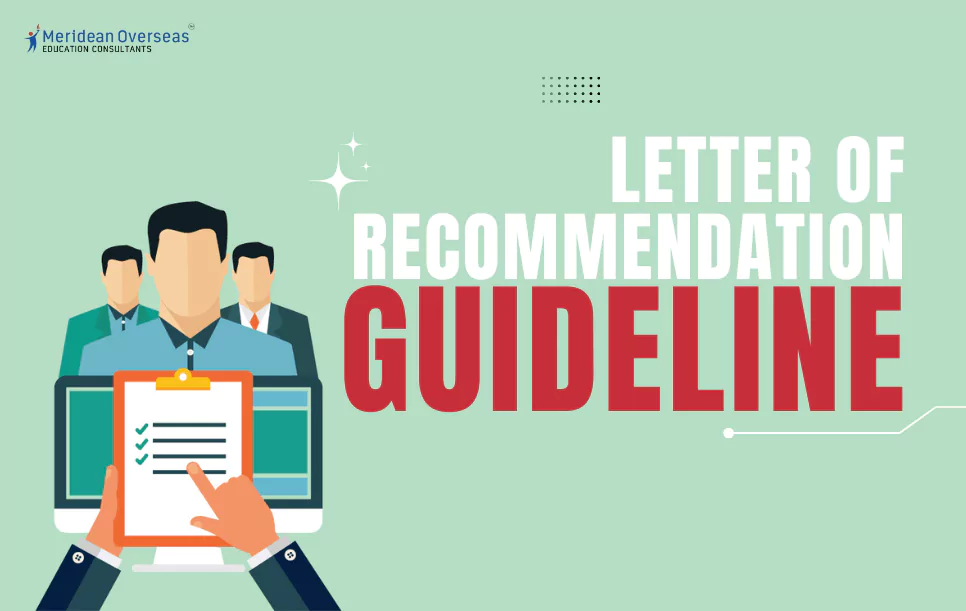
Announcements

Announcements

If you are trying to write a letter of recommendation (LOR), you might find many different formats online. But with so many options, it can be confusing to pick the right one. Sometimes, students use the wrong format, which can mess up their application. To help avoid this, Meridean Overseas Education Consultants (MOEC) provides clear guidelines for all application documents. These guidelines make it easy for students to write their LOR correctly and avoid confusion.
Here's a simple guide for writing a standard LOR for any course (like UG, MS, MBA, or PhD).

LOR Guidelines
Qualities That can be Highlighted in LOR
FAQs
Below, you can check the complete guidelines for creating a strong LOR.
In the Introduction of a Letter of Recommendation (LOR), start by mentioning the recommender's details like their name, job title, college/company name, and city. Explain how the recommender knows the student and for how long. It is important to highlight the student's position compared to others the recommender has worked with. For example, if the recommender has supervised or taught other students in the same batch, they can compare the student's performance. The recommender should also mention any specific responsibilities, like how many people the student supervised or the class size. End this paragraph by saying the outstanding qualities of the student that impressed the recommender. This shows the qualities and attributes the recommender will discuss in the following paragraphs.
Start by talking about one great thing the student is good at, like being good at school, doing great research, thinking of creative ideas, leading well, organising stuff, working in a team, taking charge, working hard, or being mature. Pick one of these or something else that fits the student. Then, tell a story about when the student showed this skill. This story is super important because it proves that the student really has that skill. These stories are essential in a Letter of Recommendation (LOR) because they show the student's abilities in action. The main idea is to "show" what the student can do with real examples instead of just "telling" about it.
In a Letter of Recommendation (LOR), it's important to mention three or four different things the student is good at. Tell a story about when the student showed that skill for each quality. These stories help the admissions staff understand the students' abilities better. When the recommender shares real stories, it makes their words more believable.
Add a third skill or quality of the student and back it up with an example that the recommender saw firsthand. Make sure each paragraph in the letter talks about a different skill or quality, with a different example for each one. It is important to create each Letter of Recommendation (LOR) uniquely from the others without repeating any qualities or examples. Each example should be specific to that recommender's experience with the student.
This is the final part of the Letter of Recommendation (LOR). Here, you will sum up the student's strengths and give a strong, positive recommendation. Avoid repeating qualities or examples, and ensure each example is unique to the recommender's experience with the student. Don't add new ideas in the conclusion; just emphasise the qualities discussed earlier.
Below, you can check some qualities that can be highlighted in academic and professional LOR.
Academic Skills
Research Skills and Experience
Passion for the Subject
Fit for the Program
Creative Thinking
Perseverance and Motivation
Initiative Taking
Achievements
Leadership Abilities
Teamwork Skills
Communication Skills
Understanding Ability
Work Ethic
Maturity
Integrity
Handling Setbacks
Empathy and Support
Application Skills
Self-Confidence
Critical Thinking
Interest in Faculty's Work
Extracurricular Involvement
Leadership Abilities
Teamwork Skills
Diverse Background
Career Growth
Global Experience
Community Involvement
Achievements
Time Management
Communication Skills
Business Understanding
Decision Making
Presentation Ability
Analytical Thinking
Motivation
Maturity
Integrity
Handling Challenges
Empathy
1. Should I waive my right to see my LORs?
Waiving your right to see your Letters of Recommendation is generally recommended, as it allows your recommenders to provide honest assessments of your qualifications without concerns about privacy or confidentiality. However, you are ultimately responsible for deciding to waive your rights, and you should consider the implications carefully before making a decision.
2. What should I do if my recommender declines to write me a letter?
If a potential recommender declines to write you a letter, respect their decision and consider seeking recommendations from other individuals who are familiar with your qualifications and character. It's important to maintain professional relationships and not take the refusal personally.
3. Are there any specific content guidelines for academic versus professional LORs?
The specific content of Letters of Recommendation may vary depending on the context and purpose; both academic and professional LORs should provide insights into the candidate's qualifications, achievements, and character. Academic LORs may focus more on the candidate's academic performance and potential, while professional LORs may emphasise their work experience, skills, and contributions.
4. Can I request an update or additional LOR after submitting my application?
In some cases, you may be able to request an update or additional LOR after submitting your application. However, it is important to check the application guidelines and deadlines and to communicate with the relevant parties to ensure that any additional materials are submitted correctly and on time.
5. How long should my LOR request be before the application deadline?
It is generally recommended to request Letters of Recommendation well in advance of the application deadline, ideally several weeks or even months beforehand. This allows your recommenders sufficient time to write thoughtful and personalised letters and ensures your application is submitted on time.

Contact MOEC Experts for Study Abroad Guidance!

MOEC